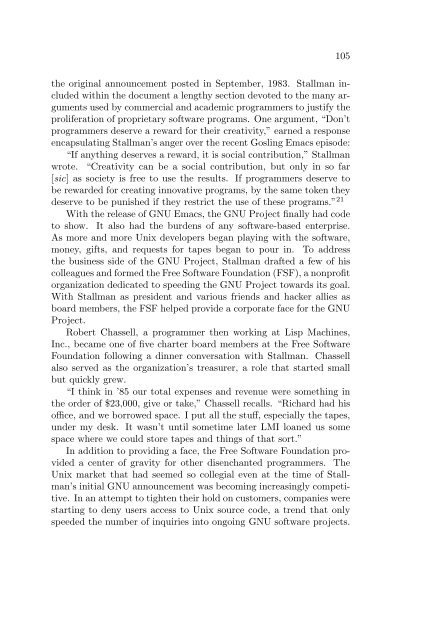You also want an ePaper? Increase the reach of your titles
YUMPU automatically turns print PDFs into web optimized ePapers that Google loves.
105<br />
the original announcement posted in September, 1983. Stallman included<br />
within the document a lengthy section devoted to the many arguments<br />
used by commercial and academic programmers to justify the<br />
proliferation of proprietary software programs. One argument, “Don’t<br />
programmers deserve a reward for their creativity,” earned a response<br />
encapsulating Stallman’s anger over the recent Gosling Emacs episode:<br />
“If anything deserves a reward, it is social contribution,” Stallman<br />
wrote. “Creativity can be a social contribution, but only in so far<br />
[sic] as society is free to use the results. If programmers deserve to<br />
be rewarded for creating innovative programs, by the same token they<br />
deserve to be punished if they restrict the use of these programs.” 21<br />
With the release of GNU Emacs, the GNU Project finally had code<br />
to show. It also had the burdens of any software-based enterprise.<br />
As more and more Unix developers began playing with the software,<br />
money, gifts, and requests for tapes began to pour in. To address<br />
the business side of the GNU Project, Stallman drafted a few of his<br />
colleagues and formed the Free Software Foundation (FSF), a nonprofit<br />
organization dedicated to speeding the GNU Project towards its goal.<br />
With Stallman as president and various friends and hacker allies as<br />
board members, the FSF helped provide a corporate face for the GNU<br />
Project.<br />
Robert Chassell, a programmer then working at Lisp Machines,<br />
Inc., became one of five charter board members at the Free Software<br />
Foundation following a dinner conversation with Stallman. Chassell<br />
also served as the organization’s treasurer, a role that started small<br />
but quickly grew.<br />
“I think in ’85 our total expenses and revenue were something in<br />
the order of $23,000, give or take,” Chassell recalls. “Richard had his<br />
office, and we borrowed space. I put all the stuff, especially the tapes,<br />
under my desk. It wasn’t until sometime later LMI loaned us some<br />
space where we could store tapes and things of that sort.”<br />
In addition to providing a face, the Free Software Foundation provided<br />
a center of gravity for other disenchanted programmers. The<br />
Unix market that had seemed so collegial even at the time of Stallman’s<br />
initial GNU announcement was becoming increasingly competitive.<br />
In an attempt to tighten their hold on customers, companies were<br />
starting to deny users access to Unix source code, a trend that only<br />
speeded the number of inquiries into ongoing GNU software projects.


